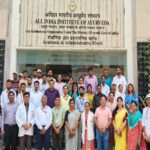The first 1.6 million cases in India took about 6 months, the next 1.6 million cases have occurred in less than 1 month : Reveals study by Samhita Social Ventures
India
healthysoch
New Delhi, September 04, 2020 :
Samhita Social Ventures, a leading social sector consulting firm, has released ‘Chasing the Virus’ – COVID-19 Trend Review Report. It showcases the recent trends at a district level to understand the larger impact due to COVID-19. The study was conducted as part of its ‘India Protector Alliance’ (IPA) initiative, which is in partnership with Bill & Melinda Gates Foundation and RBL Bank.
The statistics in the report reveal that while the COVID-19 cases were prevalent in the bigger cities initially, the virus spread is significantly higher in smaller districts, towns and rural areas. The review period of the report has been between July1, 2020 till August 17, 2020. The data revealed that 95% of new active cases and 63% of fatalities due to COVID-19 occurred in districts outside the big 11 districts. On the basis of these findings, Samhita has identified 226 districts across India that needs immediate attention. The district mapping has been done keeping in account for 95% of active cases growth and 66% of fatalities. Since the virus has moved to the smaller districts, governments, philanthropies and corporate CSR need to meet this challenge by focusing on them. The study also projects that India will have over 100,000 fatalities by end of September 2020.
A quick analysis of the priority districts reveal that the worst affected states due to COVID-19 are Maharashtra, Tamil Nadu, Andhra Pradesh, Karnataka, Uttar Pradesh, West Bengal, Kerala, Bihar and Odisha. These states together represent 60% of India’s GDP. The report has defined Big 11 districts as Mumbai, Pune, Thane, Chennai, Delhi (the whole state), Bengaluru Urban, Kolkata, Ahmedabad, Jaipur, Gurgaon and Noida. These districts have been the focus of COVID-19 battle from corporate CSR and philanthropies, but are now seeing significant drop in active cases.
Priya Naik, Founder and CEO, Samhita Social Ventures, said, “We believe that the economic recovery of India and associated uptick in demand as well as corporate earnings are intricately linked to the COVID-19 situation in the country. However, the report suggests that while big cities are showing decline in active cases, the fight against the virus is far from over, and we now have to take the battle to the smaller districts, rural areas and towns. Given that India’s healthcare system is concentrated in the large urban centers, this presents a substantial challenge in the upcoming months. We believe the government alone cannot be responsible for this battle and philanthropies, corporate CSR and other donors across need to come together, to strengthen the healthcare system in the smaller districts.”
IPA recommends a three-pronged approach to donors to help in the battle against COVID-19: Prevent,
Prepare and Provide
· Prevent – Encourage behavior change to proper and consistent usage of masks, good sanitation practices and social distancing
· Prepare – Support COVID-19 training of doctors, nurses, health workers in small district (especially smaller clinics, nursing homes, small hospitals)
· Provide – Provide key medical equipment and focus on providing oxygenation and respiratory equipment
healthysoch







